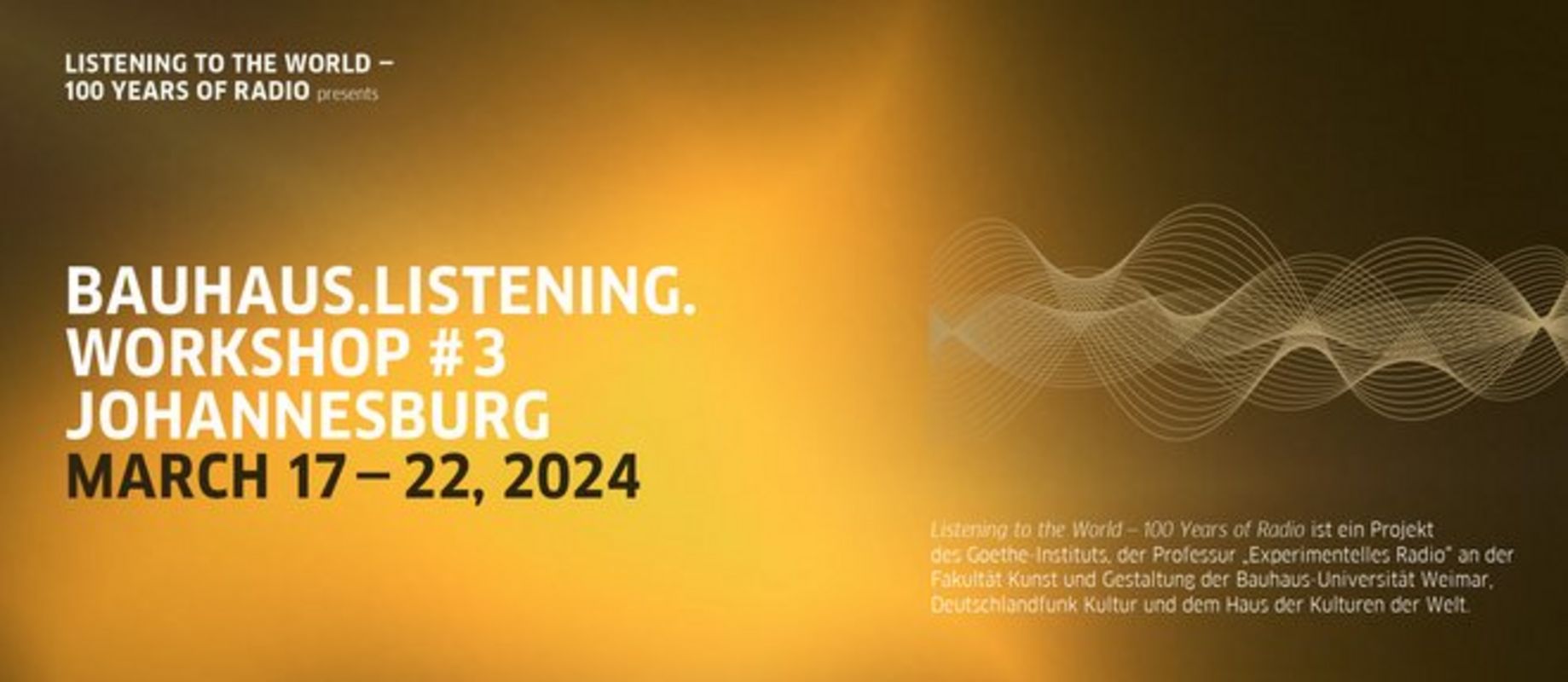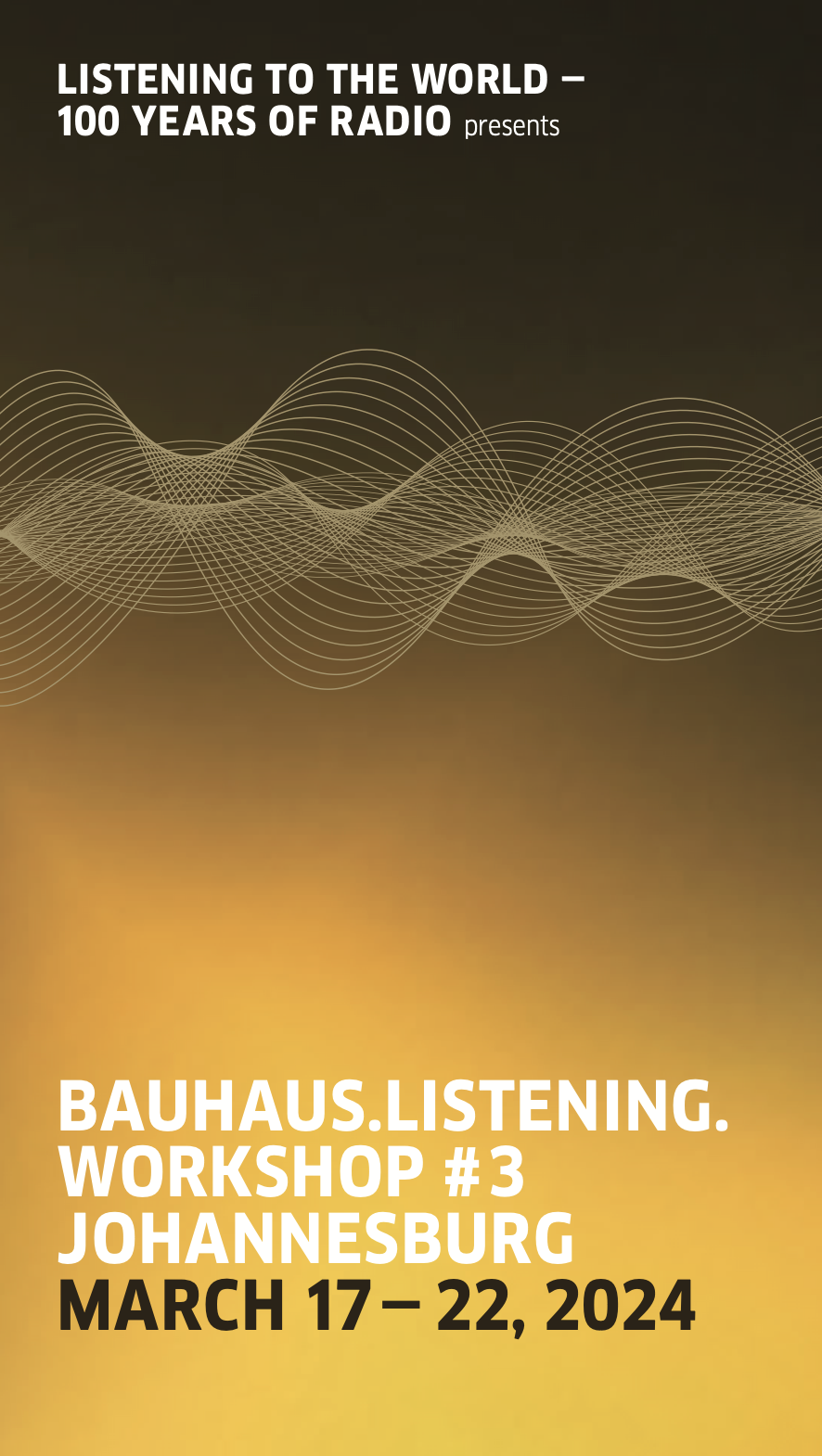Radio listening in Southern Africa is strongly interwoven with indigenous listening. The history of radio in this region is influenced by guerrilla radio, including during the independence struggles, and older techniques of telecommunication through music. The workshop, curated by Masimba Hwati, will be led by Nathalie Singer, Professor of Experimental Radio, with the support of the Goethe-Institut Johannesburg and Frederike Moormann.
»In most of Southern Africa listening is shared with others id est. ancestral others, present others, others not yet born. Listening also means that all matter is/ has/ can be an ear (receiver) or mouth (transmitter). Even the tongue can be an ear, an apparatus of reception and listening, but also with an ability to sound and vibrate. How can these cultural ways of listening be applied and preserved today and what is the place of radio in all this?«, Masimba Hwati asks in his curatorial statement.
Among the guests are researchers such as radio the renowned broadcasting expert Sekibakiba Peter Lekgoathi, whose book »Guerilla Radios in Southern Africa« makes an important contribution to the debate on radio in Southern Africa. Curators such as Aino Moongo, who curated the exhibition »Stolen Moments«, which retells the history of Namibian music, and musicians like Fernando Damon, radio producers like Cynthia Marangwanda and radio founders like Ntone Edjabe (Panafrican Space Station) will also take part in the workshop. Transcultural exchange on diverse practices of listening and oral traditions play a role in contributions on the musical instrument Mbira by Reginald Tinavapi or on the ritual Malopo dances by Duduzile Mazuku, but also in archive sessions such as Nickita Maesala's in the »Museum of Things we Forgot to Remember« and an activation of archive materials in joint jam sessions.
The project aims to create a space that enables participants from different contexts to share their experiences, challenges and tools for collaborative organisation. The focus is therefore on the question of the responsibility of the cultural technique of listening for future forms of society and the development of new models for our acoustic media of the future.
The workshop and research results will be collected on a new knowledge platform, the »Transcultural Listening Map«, and will in turn provide the source material for a podcast series on Deutschlandfunk Kultur and for productions by the participating countries. To mark the 100th anniversary of radio in October 2024, the Haus der Kulturen der Welt in Berlin is planning an event in which artistic and discursive positions relating to the project will be presented.
»Listening to the World - 100 Years of Radio« is a project by the Goethe-Institut, the Professorship of Experimental Radio at the Faculty of Art and Design at Bauhaus-Universität Weimar, Deutschlandfunk Kultur and Haus der Kulturen der Welt.
It is funded by the Goethe-Institut and the »New European Bauhaus« project of the Bauhaus-Universität Weimar. The development of the »Transcultural Listening Map« is supported by the Kreativfonds of the Bauhaus-Universität Weimar.
Bauhaus.Listening.Workshop #3
17 – 22 March 2024
Goethe-Institut Johannesburg
Participants:
Aerosol-Tinofireyi Zhou (Zimbabwe)
Aino Moongo (Germany / Namibia)
Cynthia Marangwanda (Zimbabwe)
Fernando Damon (South Africa)
Kim Karabo Makin (Botswana)
Mazuku Duduzile (South Africa)
Naledi Chai (South Africa)
Nesindano Namises (Namibia)
Nickita Maesela (South Africa)
Reginald Tinavapi (Zimbabwe)
Sekibakiba Peter Lekgoathi University of the Witwatersrand, (South Africa)
Siviwe James (South Africa)
Tendayi Chakanyuka (Zimbabwe)
Ntone Edjabe Panafrican Space Station / Chimurenga, (South Africa) (online)
Aaron Peters The Other Radio, (South Africa) (online)
Nathalie Singer is professor for Experimental Radio at the Bauhaus-Universität Weimar. She works as radio artist, curator and producer, composes for various media, publishes on the topic of sound art. She was dramaturge in the radio play department of Deutschlandradio Kultur, where she developed new radio play formats (Wurfsendung). Her artistic research focuses on the development of Radio Art archives and their artistic mediation (travelling exhibition Radiophonic Spaces). Currently she created the Bauhaus.Listening.Workshop (artistic research project “Listening to the World”) and is particularly interested in the cultural technique of listening and its potential in shaping new environments.
Masimba Hwati was born in Harare, two years following the second chimurenga. That year Juluka released ‘Scatterlings of Africa’ a hit song inspiring phantasms of exotic gaze(s) against a backdrop of a brutal Apartheid system in South Africa. Toto also released Africa and Michael Jackson released Human nature, Bhundu boys released the single Uneshuwa here? Later that year going into the next, The new Zimbabwean Government unleashed ‘Gukurahundi’ an ethnic cleansing genocide. Masimba’s work deals with sound, listening, micro-politics, resistance and negotiation. He’s created projects in Harare, Detroit, Johannesburg, Capetown, Blackburn ,Vienna,Weimar, South Carolina, Vienna, Leeds and Nova Scotia.
Frederike Moormann is a radio and sound artist as well as an artistic researcher. She completed her BA in physics at LMU Munich and her MA in philosophy and history at King’s College London/ LMU Munich. Her research-based and site-specific sound works revolve around remembrance culture and spatial perception. She co-curated the exhibition + radio programme “Anybody out there?! – 100 years of radio” in Leipzig, Germany. Her current artistic research copes with the involvement of telecommunication infrastructure in colonialism. She is artistic associate in the Experimental Radio.
Goethe-Institut Johannesburg: www.goethe.de/ins/za/en/ueb.html
Responsible:
Led by:
Nathalie Singer
co-curate by:
Masimba Hwati
Supported and organized:
Goethe-Institut Südafrika und Frederike Moormann
Every region of the world has its own stories of listening and unlistening, of gathering and dividing communities around the radio. But because radio waves do not stop at national borders, these stories are interconnected in many ways. The project would like to explore the regional differences in the four-part series of events the Bauhaus.Listening.Workshops on different continents: in South America, Southeast Asia and Southern Africa, among others, artists, researchers, media professionals and listeners from the respective regions will address various questions about listening as a cultural technique in its diversity and its transcultural interconnections.



